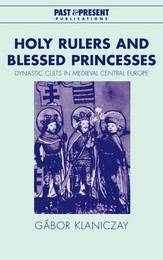
|
Holy Rulers and Blessed Princesses: Dynastic Cults in Medieval Central Europe
Hardback
Main Details
| Title |
Holy Rulers and Blessed Princesses: Dynastic Cults in Medieval Central Europe
|
| Authors and Contributors |
By (author) Gabor Klaniczay
|
|
Translated by Eva Palmai
|
| Series | Past and Present Publications |
|---|
| Physical Properties |
| Format:Hardback | | Pages:512 | | Dimensions(mm): Height 229,Width 152 |
|
| Category/Genre | World history - c 500 to C 1500 |
|---|
| ISBN/Barcode |
9780521420181
|
| Classifications | Dewey:274.303 274.303 |
|---|
| Audience | | Professional & Vocational | |
|---|
| Illustrations |
91 Halftones, unspecified
|
|
Publishing Details |
| Publisher |
Cambridge University Press
|
| Imprint |
Cambridge University Press
|
| Publication Date |
14 March 2002 |
| Publication Country |
United Kingdom
|
Description
Medieval dynasties frequently relied upon the cult of royal saints for legitimacy. After the early medieval emergence of this type of sainthood, in the central middle ages most royal dynasties had saints in their family: Edward the Confessor, Olaf, Canute, Louis IX, Charlemagne, the Emperor Henry II, and Wenceslas are some of the best-known examples. Within this context the saints of the Hungarian ruling dynasty - the Arpadians - constitute a remarkable sequence: St Stephen, St Emeric, St Ladislas, St Elizabeth, St Margaret, and other central European blessed princesses, whose convents mirrored the Court of Heaven. This sequence of dynastic saints provide a unique example of the late medieval evolution of royal and dynastic sainthood. Building upon a series of case studies from Hungary and central Europe, Gabor Klaniczay proposes an original new synthesis of the multiple forms and transformations of royal and dynastic sainthood in medieval Europe.
Reviews'... opens up a whole world to the anglophone public ... Both Gabor Laniczay and the rulers and princesses he writes about deserve a wider audience.' History 'This book ... is a valuable contribution to the study of sanctity in medieval Hungary.' The Journal of Ecclesiastical History
|